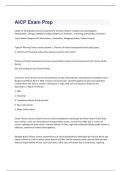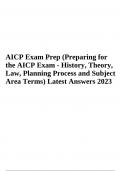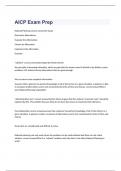Aicp exam prep 20 - Study guides, Class notes & Summaries
Looking for the best study guides, study notes and summaries about Aicp exam prep 20? On this page you'll find 13 study documents about Aicp exam prep 20.
Page 2 out of 13 results
Sort by

-
AICP Exam Prep 2023 with 100% correct answers
- Exam (elaborations) • 4 pages • 2023
-
Available in package deal
-
- $16.49
- + learn more
Ladder of Participation Sherry Arnstein, Bottom of ladder {non participation - Manipulation, Therapy.} Middle of ladder {Degrees of Tokensim - Informing, Consultation, Placation} Top of ladder {Degrees of Citizen Power - Partnership, Delegated Power, Citizen Control} Types of Planning Theory 1. Theories of Urban Development (how cities grow). 2. Theories of Planning Practice (How planners perform their work). Theories of Urban Development Patterns within a city {Concentric Cir...

-
AICP Exam Practice Questions With 100% Correct Answers | Latest Update (Graded A+)
- Exam (elaborations) • 13 pages • 2023
-
- $18.49
- + learn more
Clean Water Act - Answer 1972 - the primary federal law in the United States governing water pollution. Established the goals of eliminating releases of high amounts of toxic substances into water, eliminating additional water pollution by 1985, and ensuring that surface waters would meet standards necessary for human sports and recreation by 1983. The principal body of law currently in effect is based on the Federal Water Pollution Control Amendments of 1972 and was significantly expanded...

-
AICP Exam Prep 2023 with 100% correct answers
- Exam (elaborations) • 5 pages • 2023
-
Available in package deal
-
- $15.49
- + learn more
Rational Planning Set Goals Determine Alternatives Evaluate the Alternatives Choose an Alternative Implement the Alternative Evaluate "satisfice" developed by Herbert Simon the principle of bounded rationality, which accepts that the human mind is limited in its ability to solve problems. We instead choose alternatives that are good enough. We can never have complete information. Assumes that a planner has perfect knowledge of all of the factors in a given situation. A p...

Do you wonder why so many students wear nice clothes, have money to spare and enjoy tons of free time? Well, they sell on Stuvia! Imagine your study notes being downloaded a dozen times for $15 each. Every. Single. Day. Discover all about earning on Stuvia


